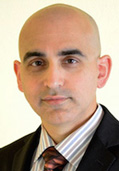ARCHIVED: NOT AVAILABLE FOR CREDIT
Evidence-Based Immunohistochemical Panels for the Diagnosis of Hepatocellular Neoplasms
Discussion of challenges in the diagnosis of focal nodular hyperplasia, hepatocellular adenoma and well-differentiated hepatocellular carcinoma. Interpretation of different clinical scenarios will be addressed with an emphasis on implications of the diagnosis on patient management. The subtyping of hepatocellular adenoma and the significance of beta-catenin activation will be discussed.
Originally presented on February 5, 2018, in Park City, Utah.
Lecture Presenter
 | Sanjay Kakar, MD Professor of Anatomic Pathology; Chief, Gastrointestinal-Hepatobiliary Pathology Service; Director, Gastrointestinal-Hepatobiliary Pathology Fellowship Program |
Sanjay Kakar, MD, is professor of pathology, Chief of the GI-liver pathology service, and GI-liver pathology fellowship director at University of California San Francisco. After completing medical school training in India, he attended the University of Illinois in Chicago for pathology residency followed by GI-liver and molecular pathology fellowships at Mayo Clinic, Rochester, MN. He is past president of United States Gastrointestinal Pathology Society, has served on the CAP Surgical Pathology Committee and is currently a member of the CAP Cancer Committee and AJCC staging panel for colorectal and hepatobiliary cancers. His principal research interests are focused on hepatocellular adenoma, hepatocellular carcinoma and colorectal cancer.
Objectives
After this presentation, participants will be able to:
- Distinguish focal nodular hyperplasia and hepatocellular adenoma
- Describe the new classification of hepatocellular adenoma and its practical implications
- Distinguish hepatocellular adenoma from hepatocellular carcinoma
Sponsored by:
University of Utah School of Medicine, Department of Pathology, and ARUP Laboratories
 Site Search
Site Search

